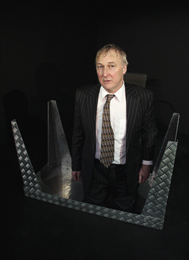We Irish have a great knack of assigning and avoiding blame. We huff and puff about what state the country is in while sidestepping our role in it. We harangue across social and traditional media platforms about the games our politicians play, but rarely change our own tactics. And while our faces flush with fury when faced with follies of old, we usually avoid eye contact with the injustices of the present day.
There's no avoiding the dung that's hit the fan in Erris, North Mayo where Shell are constructing a natural gas pipeline through the village. It’s the only place in the world that such a move has been allowed to take place in a residential area. In his one-man show Ailliliú Fionnuala, Donal O’Kelly makes us partners in crime, by addressing us directly in his underground lair, mentioning our powers of persuasion when it comes to manipulating the media. We, the audience, are 'Dennis', apprentice to Ambrose Keogh, a PR Executive who has been put under a geis, a sort of truth telling spell, by a pissed off Child of Lir – Fionnuala, to be exact, who's less than impressed to have her name dragged into the mud. Her namesake, the tunnel-boring machine used by Shell, is sinking into the bog as Ambrose speaks. After a car crash lands him in her fairy court, Fionnuala makes Ambrose tell the truth, the whole truth and nothing but the truth about the real life assault on environmental protestor Willie Corduff.
O’Kelly mixes fact and fiction, drawing on Biblical, mythological and original stories based on true life events, to crystalise his point. Democracy has gone down the Suwannee in Ireland, and this is not the first time we forgot the paddle. An able storyteller, O’Kelly engages from the off, staring us down and making us sure of our role in proceedings, manipulating a stainless steel desk to illustrate the action. Director Sorcha Fox keeps such action to the minimum, however, so that the emphasis is kept on the words, and while the occasional funny voice can perhaps ruin the mystical atmosphere, it lightens the mood to this occasionally sensationalist work.
 While a stirring piece of theatre, it raises serious questions over the extent to which a playwright should wield his dramatic license. Having a character as loathsome as Ambrose confess to his involvement in the attack simply plays on people's suspicions as to what happened to Corduff. With Ambrose being such a malign sort, it leaves us with no greater understanding as to the type of man that would perpetrate such a crime. Such a stock villain can make the piece feel both manipulative and exploitative.
While a stirring piece of theatre, it raises serious questions over the extent to which a playwright should wield his dramatic license. Having a character as loathsome as Ambrose confess to his involvement in the attack simply plays on people's suspicions as to what happened to Corduff. With Ambrose being such a malign sort, it leaves us with no greater understanding as to the type of man that would perpetrate such a crime. Such a stock villain can make the piece feel both manipulative and exploitative.
But Ambrose is not the only bad guy in this story. O’Kelly’s aim is greater than feeding our distrust and disdain for multinationals. He’s drawing on a story that should be familiar to us and laying it beside one that most certainly is, that of clerical abuse, introduced by a former classmate of Ambrose, an anti-pipeline campaigner who acts as both character witness and witness for the prosecution at Ambrose’s trial.
Drawing attention to the rot that’s still at Ireland’s core, O’Kelly points out that while the clergy are, for the most part, out, the corporations are in and the collusion to deny the people of Ireland their civil rights is still played out in backrooms and boardrooms. He spears the media for the fog they have pulled down over the eyes of the public, as one of the characters asks: “How so much violence can be steadily inflicted for so long, and by so many… we’re marked by it. If not physically, then mentally.”
Lines like this make Ailliliú Fionnuala an occasionally uncomfortable watch. It reminds us of our own inaction when heinous crimes are committed yet again, our refusal to make a stand against them making us culpable. Thoughts of ‘it’ never being allowed to happen again, feel as hollow as the supposedly cathartic confession. We have assumed the role of the villain.
O'Kelly's play on words and comic accents will raise a smile, but his condemnation – of both them and us – leaves its mark.
Caomhan Keane is a freelance journalist who has written about theatre for The Irish Times and the Sunday Independent and is senior theatre writer at entertainment.ie